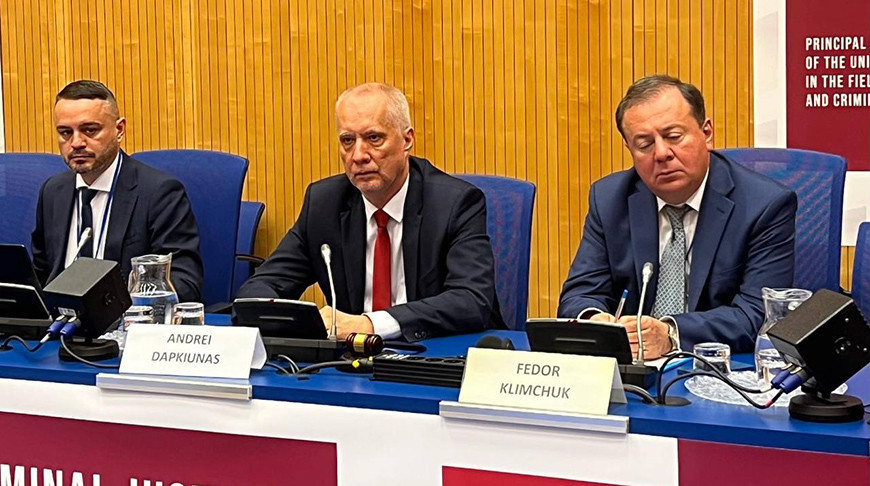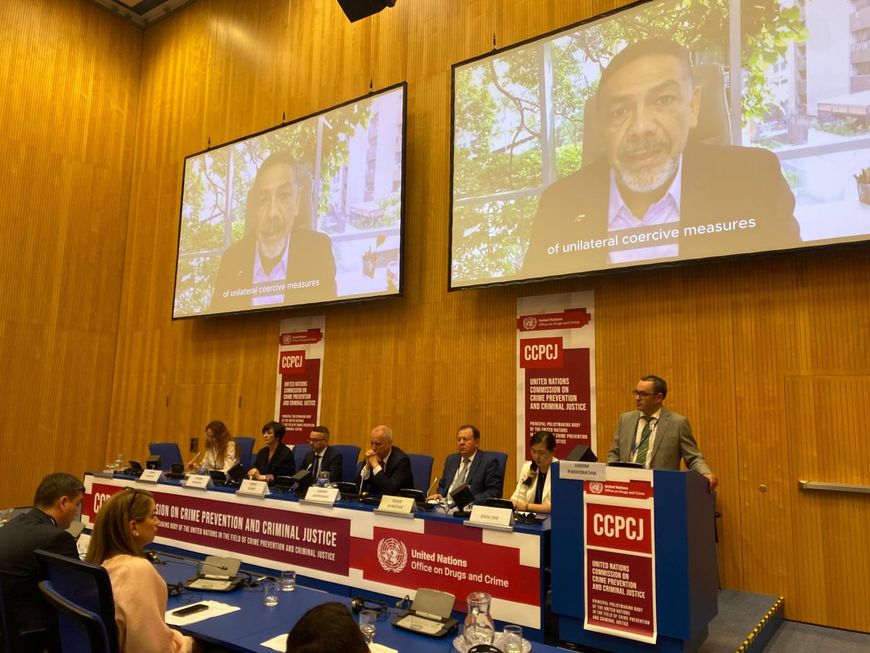
MINSK, 23 May (BelTA) - The thematic forum titled as The Current Problems of International Criminal Cooperation and Justice was held in the Vienna International Center (Austria) on the sidelines of the 34th session of the UN Commission on Crime Prevention and Criminal Justice, BelTA learned.
The forum was initiated by Belarus. It was organized in partnership with Iran, Nicaragua, Russia and Venezuela.
The event brought together heads and representatives of diplomatic missions accredited to the UN Office in Vienna, heads and participants of national delegations to the Commission sessions, representatives of international and non-governmental organizations.
Belarus’ Permanent Representative to the International Organizations in Vienna Andrei Dapkiunas,addressed the meeting with a welcoming speech. ‘In our increasingly divided world, supporters of a certain point of view on the desired political shape of the world are de facto introducing a new criterion of acceptability for international criminal cooperation and justice. This criterion is political attractiveness, which we do not agree with,” Andrei Dapkiunasemphasized.
Heads and representatives of law enforcement and legal agencies and institutions of Venezuela, China, Russia and the UN Office on Drugs and Crime made reports during the discussion.

The participants of the thematic briefing had a comprehensive consideration of the problems of development of international cooperation in the criminal sphere. They noted the unprecedented politicization of bilateral and multilateral cooperation in the field of mutual legal assistance and assistance to law enforcement agencies, extradition and other aspects of combating transnational organized crime. Speakers drew attention to the increase in the denial of assistance in criminal cases for political reasons, even in cases involving ordinary violent crimes.
The forum participants stressed the need to prevent the politicization of international anti-crime cooperation, including extradition and mutual legal assistance, and the activities of relevant international organizations.
A speech by UN special rapporteur on the negative impact of unilateral coercive measures of human rights Elena Dovgan drew attention of the forum participants as unilateral coercive measures are one of the main obstacles to effective international cooperation in criminal cases and in the fight against transnational crime.
The forum was initiated by Belarus. It was organized in partnership with Iran, Nicaragua, Russia and Venezuela.
The event brought together heads and representatives of diplomatic missions accredited to the UN Office in Vienna, heads and participants of national delegations to the Commission sessions, representatives of international and non-governmental organizations.
Belarus’ Permanent Representative to the International Organizations in Vienna Andrei Dapkiunas,addressed the meeting with a welcoming speech. ‘In our increasingly divided world, supporters of a certain point of view on the desired political shape of the world are de facto introducing a new criterion of acceptability for international criminal cooperation and justice. This criterion is political attractiveness, which we do not agree with,” Andrei Dapkiunasemphasized.
Heads and representatives of law enforcement and legal agencies and institutions of Venezuela, China, Russia and the UN Office on Drugs and Crime made reports during the discussion.

The participants of the thematic briefing had a comprehensive consideration of the problems of development of international cooperation in the criminal sphere. They noted the unprecedented politicization of bilateral and multilateral cooperation in the field of mutual legal assistance and assistance to law enforcement agencies, extradition and other aspects of combating transnational organized crime. Speakers drew attention to the increase in the denial of assistance in criminal cases for political reasons, even in cases involving ordinary violent crimes.
The forum participants stressed the need to prevent the politicization of international anti-crime cooperation, including extradition and mutual legal assistance, and the activities of relevant international organizations.
A speech by UN special rapporteur on the negative impact of unilateral coercive measures of human rights Elena Dovgan drew attention of the forum participants as unilateral coercive measures are one of the main obstacles to effective international cooperation in criminal cases and in the fight against transnational crime.
At the end of the forum, the participants prepared a summary of the discussion with recommendations for strengthening international cooperation in combating crime.













